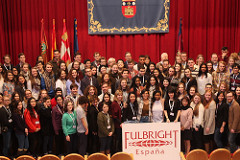La Comisión de Intercambio Cultural, Educativo y Científico entre España y los Estados Unidos de América se estableció en España en 1958 por acuerdo ejecutivo entre los dos países. Desde entonces se conoce como Comisión Fulbright por las becas que administra. El acuerdo se renovó en 1994 ampliando los objetivos de la Comisión original y subrayando su independencia.
La s becas llevan el nombre del Senador J. William Fulbright (1905-1995), responsable de la legislación, vigente aún hoy, que obliga al Congreso de Estados Unidos a asignar una cantidad anual para el desarrollo del programa. Con el tiempo, el Programa Fulbright es el nombre con el que se conoce al acuerdo para la cooperación cultural y educativa entre Estados Unidos y los países que lo suscriben. España es uno de los países que lo hace a través de la Comisión.
s becas llevan el nombre del Senador J. William Fulbright (1905-1995), responsable de la legislación, vigente aún hoy, que obliga al Congreso de Estados Unidos a asignar una cantidad anual para el desarrollo del programa. Con el tiempo, el Programa Fulbright es el nombre con el que se conoce al acuerdo para la cooperación cultural y educativa entre Estados Unidos y los países que lo suscriben. España es uno de los países que lo hace a través de la Comisión.
La Comisión está formada por representantes de los dos países y copresidida por un alto cargo del Ministerio de Asuntos Exteriores, Unión Europea y Cooperación y otro de la Embajada de Estados Unidos en España. La Comisión administra uno de los Programas Fulbright más importantes del mundo por presupuesto y dotación de las becas, gracias, sobre todo, a la contribución que recibe de la administración pública española. El Gobierno de España y los de algunas autonomías financian los costes directos de las becas para españoles y parte de los correspondientes a algunos programas para americanos. El Gobierno de Estados Unidos no sólo subvenciona a los becarios estadounidenses en España, sino que también se hace cargo de los gastos de gestión de los programas en Estados Unidos, seguimiento y apoyo de los becarios españoles, seguros de accidente y enfermedad y el coste completo de alguno de los programas especiales.
Los programas generales de la Comisión se financian por ambos Gobiernos, el de Estados Unidos a través del U.S. Department of State y el de España a través del Ministerio de Asuntos Exteriores, Unión Europea y Cooperación y del Ministerio de Ciencia e Innovación; Igualmente, participan en la financiación de programas específicos los Ministerios de Cultura y Deporte; el de Industria, Comercio y Turismo; el de Asuntos Económicos y Transformación Digital, el de Transportes, Movilidad y Agenda Urbana y el Instituto Nacional de Administración Pública, así como Gobiernos Autonómicos como el de la Comunidad de Madrid, la Junta de Andalucía, la Xunta de Galicia, La Rioja, el Principado de Asturias, Canarias y la Región de Murcia. Otros patrocinadores privados del Programa Fulbright son El Corte Inglés, el IE Business School, el Instituto Internacional en España, la Fundación Iberdrola, la Fundación Ramón Areces, La Fundación Mapfre, Grifols, The New York Film Academy, Williams and Mary College y The University of Maryland-Baltimore County.
La J. William Fulbright Foreign Scholarship Board, nombrada por el Presidente de Estados Unidos, se encarga de la supervisión del Programa. Esta Junta Directiva marca los límites del programa y dicta las normas de carácter universal que se aplican durante el proceso de selección y para la administración de las becas.
El valor real de cada una de las becas concedidas es mucho mayor que el anunciado en las convocatorias, por los servicios no tasados que incluye y, sobre todo, por la colaboración desinteresada y extraordinaria de miles de voluntarios –muchos de ellos exbecarios-, universidades y otras instituciones que hacen posible el Programa.
Miembros de la Comisión y su Secretaría
The Commission on Cultural, Educational a nd Scientific Exchange between Spain and the United States of America was established in Spain in 1958 by a mutual agreement between the two countries. Since then it has been recognized as the Fulbright Commission and administers grants under the same name. The agreement was renewed in 1994, expanding the Commission’s original objectives and emphasizing its independence.
nd Scientific Exchange between Spain and the United States of America was established in Spain in 1958 by a mutual agreement between the two countries. Since then it has been recognized as the Fulbright Commission and administers grants under the same name. The agreement was renewed in 1994, expanding the Commission’s original objectives and emphasizing its independence.
The grants carry the name Senator J. William Fulbright (1905-1995), responsible for the legislation still in effect to this day, which requires the United States Congress to allocate a certain quantity annually for the development of the program. Over the course of time, the Fulbright Program has become the recognized name of this agreement of cultural and educational cooperation between the United States and the participating countries. Spain is one of the countries that takes part in this program through the Commission.
The Commission is formed by representatives from the two countries and co-chaired by a high-level member of the Ministry of Foreign Affairs, European Union and Cooperation and another from the United States Embassy in Spain. The Commission administers one of the most important Fulbright Programs worldwide, based on budget and grant funding, thanks to, in large part, the contribution received by the Spanish Public Administration. The Spanish government and those of some Autonomous Regions finance the direct costs of the grants for Spaniards and part of the corresponding costs of some programs for Americans. The United States government not only subsidizes the American grant holders in Spain, but also takes care of administration expenses of the programs in the United States, monitors and supports the Spanish grant holders, provides accident and illness insurance, and covers the full cost of some of the special programs.
The Commission’s core program is financed by both the Spanish and the American Governments, through the U.S. Department of State; and the Spanish Ministry of Foreign Affairs, European Union and Cooperation as well as the Ministry of Science and Innovation. Other unilateral programs are also financed by the Spanish Ministry of Culture and Sports, the Ministry of Industry, Trade and Tourism; the Ministry of Economics; the Ministry of Public Works, and the National Institute of Public Administration, as well as the Regional Governments of Madrid, Andalusia, Galicia, La Rioja, Asturias, Canary Island and Murcia. Other sponsors of the Fulbright program are Alumni Association J.W. Fulbright, El Corte Inglés, the Ramón Areces Foundation, Grifols, Iberdrola, Mapfre, Repsol, Endesa, Telefónica, the International Institute in Spain, the IE Business School, The New York Films Academy, Williams and Mary College and, the University of Maryland- Baltimore County.
The J. William Fulbright Foreign Scholarship Board, so named by the President of the United States, oversees the supervision of the Program. The Board of Directors sets the program’s limitations and dictates the general norms to be applied throughout the selection process and to the administration of the grants.
The actual value of each of the administered grants is much higher than the amount listed, due to non-taxed services included, and above all, to the selfless and exceptional collaboration of thousands of volunteers – many of them former grant holders –, universities, and other institutions, which make the Fulbright Program possible.
